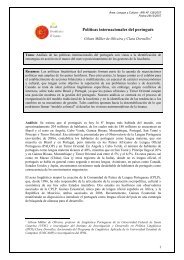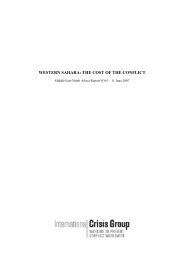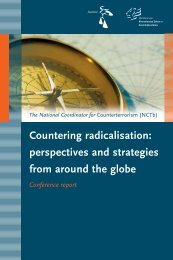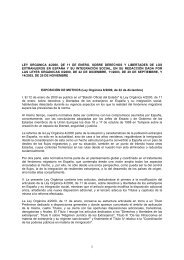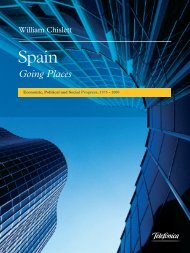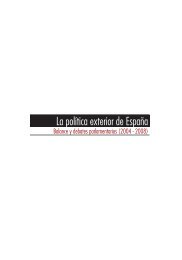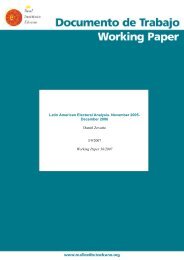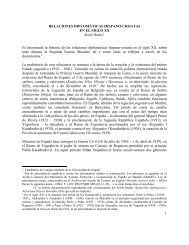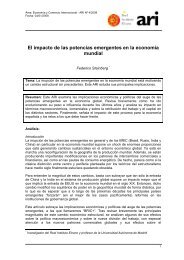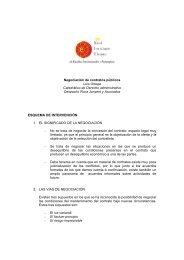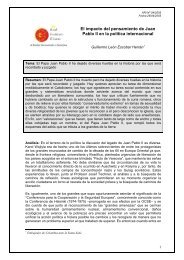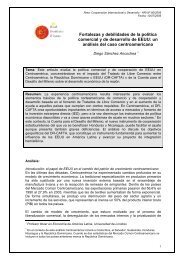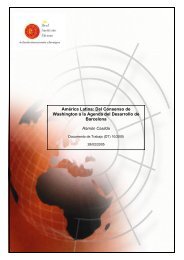Spain and the United States - Real Instituto Elcano
Spain and the United States - Real Instituto Elcano
Spain and the United States - Real Instituto Elcano
Create successful ePaper yourself
Turn your PDF publications into a flip-book with our unique Google optimized e-Paper software.
OVERVIEW 15<br />
committed Protestant, also took seriously that community’s complaints that<br />
<strong>the</strong>ir freedom to worship in <strong>Spain</strong> was severely restricted.<br />
In this climate of hostility, Franco created <strong>the</strong> so-called “Spanish lobby”.<br />
In 1945 he sent José Félix de Lequerica (<strong>Spain</strong>’s ambassador in France during<br />
<strong>the</strong> Nazi occupation), who had been refused by <strong>the</strong> <strong>United</strong> <strong>States</strong> as<br />
Ambassador, to Washington as “Inspector of Embassies <strong>and</strong> Legations”. His<br />
main mission was to create a lobby <strong>and</strong> win support for <strong>the</strong> regime, particularly<br />
among those congressmen, senators <strong>and</strong> influential Catholics who were well<br />
disposed towards Franco.<br />
He did not have to lobby that hard, although large amounts of money<br />
were spread in pursuit of <strong>the</strong> goal. Events were to bring <strong>the</strong> <strong>United</strong> <strong>States</strong> <strong>and</strong><br />
<strong>Spain</strong> toge<strong>the</strong>r.<br />
On <strong>the</strong> one h<strong>and</strong>, <strong>Spain</strong> was destitute <strong>and</strong> internationally ostracised. The<br />
Spanish economy was on its knees after <strong>the</strong> Civil War. <strong>Spain</strong>’s real GDP<br />
declined 36% between 1935 <strong>and</strong> 1938 <strong>and</strong> 28% in per capita terms. Slightly<br />
more than half of <strong>the</strong> active population worked on <strong>the</strong> l<strong>and</strong>, with antiquated<br />
technology. Moreover, winters were unusually harsh <strong>and</strong> crops poor. The 1940s<br />
were known as <strong>the</strong> ‘years of hunger’. The Argentina of General Juan Domingo<br />
Perón, one of Franco’s few allies, came to <strong>the</strong> rescue after 1946 <strong>and</strong> saved<br />
<strong>Spain</strong> from starvation by supplying it with wheat <strong>and</strong> meat (56 years later<br />
<strong>Spain</strong> shipped food <strong>and</strong> medicine to Buenos Aires, in <strong>the</strong> wake of <strong>the</strong> collapse<br />
of <strong>the</strong> Argentine economy <strong>and</strong> <strong>the</strong> default on its massive debt). Argentina<br />
stopped shipping to <strong>Spain</strong> in 1949 because of lack of payment by <strong>the</strong><br />
government. Per capita consumption of meat <strong>and</strong> wheat in 1950 was still just<br />
half <strong>the</strong> pre-Civil War level.<br />
On <strong>the</strong> o<strong>the</strong>r h<strong>and</strong>, Washington concluded that its policy of isolating <strong>the</strong><br />
country had streng<strong>the</strong>ned Franco, hindered <strong>Spain</strong>’s economic recovery <strong>and</strong><br />
made her cooperation less likely in <strong>the</strong> event of ano<strong>the</strong>r war. Dean Acheson,<br />
<strong>the</strong> Secretary of State, said <strong>the</strong> policy had not only “failed in its intended<br />
purpose, but has served to streng<strong>the</strong>n <strong>the</strong> position of <strong>the</strong> present regime”. More<br />
significantly, <strong>the</strong> Pentagon, <strong>the</strong> body most directly concerned with <strong>the</strong> Cold<br />
War challenge, had its eyes on establishing military bases in <strong>Spain</strong> because of<br />
its geo-strategic position at <strong>the</strong> sou<strong>the</strong>rn tip of Europe guarding <strong>the</strong> entrance to<br />
<strong>the</strong> western Mediterranean.<br />
<strong>Spain</strong> was <strong>the</strong> missing link to close <strong>the</strong> network of forward-deploying US<br />
bases that <strong>the</strong> Strategic Air Comm<strong>and</strong> was keen on establishing to encircle <strong>the</strong><br />
Soviet Union (bases were established in Portugal’s Azores in 1951 <strong>and</strong> in<br />
Turkey in 1952). The National Security Council issued a report in December<br />
1947 on <strong>Spain</strong> (known as document NSC 3) whose purpose, in <strong>the</strong> words of<br />
US Under-Secretary of State Robert Lovett, was to “quit kidding ourselves as



